Text
Chile - “And why does it always have to be people like me who sacrifice?”
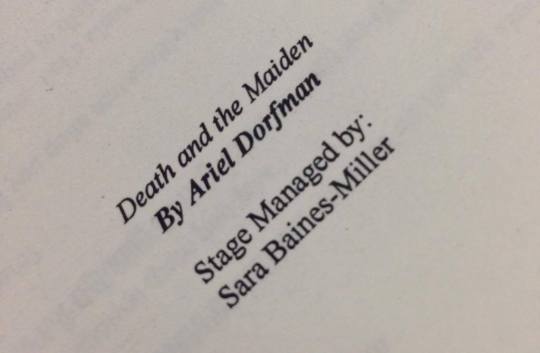
CHILE - Death and the Maiden by Ariel Dorfman
Long time no see. So, I still haven’t finished the book from Turkey, mainly because I haven’t picked it up again yet. That isn’t to say it’s not good, or that I don’t want to finish reading it. It’s to say I have been really busy, and setting aside the five or so hours it will take me to finish it right now is, for some reason, daunting. Given how hectic things have been lately, big books are an intimidating prospect, and that’s all I seem to have on my self. But I haven’t given up on this project. I want to see it through to completion, no matter how long it takes me.
So, during my down time at work today, I started doing a little research on what my next couple of books will be, and I stumbled upon this online recommendation: Death and the Maiden by Ariel Dorfman. I thought, hmm, a play? Haven’t read one of those yet for my project, might as well give it a try! My second thought was, hmm, a play? IT’LL BE SHORT OMG YES.
I started about an hour and a half ago. Ended up reading the whole thing in one sitting because it was just so. damn. good.
This play features three characters, Paulina Salas, her husband Gerardo, and a third character named Roberto, or Doctor Miranda. “The Doctor” comes to visit Paulina and Gerardo’s home and Paulina is sure that he is the man who tortured when she was a captive of an oppressive regime that has recently fallen. Drama and tragedy ensue. This play is captivating and poses some serious questions about what happens when an oppressive regime falls and a country not used to democracy has to navigate it. Now, I’ll be honest, I don’t know much about Chilean history. But the first thing I am going to do after writing this post is do some research. One of the great things about this play, in my opinion, is that the Dorfman never actually says the name of the country. It could be Chile, but it could also be any country that is experiencing a similar transition.
Give it a read, it’s short and intense. I’m going to see if I can find a video of the play to watch when I get home….
(Below are some of the good quotes!)
“We’ve forgotten what solidarity is in this country?” (5)
“The idea is that if we can throw light on the worst crimes, other abuses will also come to light.” (7)
“The judges? The same judges who never intervened to save one life in seventeen years of dictatorship? Who never accepted a single habeas corpus ever?” (8)
“We still haven't got used to it [...] to democracy. That someone knocks on your door at midnight and it’s a friend and not …” (9)
“What this country needs is justice, but if we can determine at least part of the truth…” (11)
“But I can be sick and recognize a voice.” (18)
“Because of your mad wife, who was mad because she stayed silent and is now mad because she can speak?” (26)
“The Commission can investigate the crimes but nobody is punished for them? There’s freedom to say anything you want as long as you don’t say everything you want?” (28)
“I’ll leave you men to fix the world.” (33)
“People can die from an excessive dose of the truth, you know.” (38)
“All my life, I’ve always been too obedient.” (40)
“We lied to each other out of love.” (45)
“And why does it always have to be people like me who sacrifice?” (46)
#ariel dorfman#chile#death and the maiden#latin america#latin american literature#plays#theater#theatre#book recommendations#book suggestions#read the world project#read the world challenge#play
4 notes
·
View notes
Text
Iceland - “My illness has never asked when my birthday is or whether it is Christmas or Easter.”

ICELAND - Angels of the Universe by Einar Mar Gudmundsson
In my last post, I discussed just how Angels of the Universe by Einar Mar Gudmundsson came into my possession, the last line of which was “I can’t wait to start reading this gift.” And this book has been a gift, in every sense of the word.
Let me begin by saying that I don’t know much about Iceland, other than a few vague “interesting facts” about the Icelandic language I remember from classes in linguistic anthropology. So, reading this book, a few things probably flew over my head, and many of the names of people and places (like Brynjolf and Kirkjumyri) will never escape my lips aloud (In my head it went something like “Bree – yep, that guy”). That being said, the storyline was beautiful and relatable despite my utter lack of background knowledge. I also learned a lot of things about the country. Among many other things, I learned about the NATO riots in Austurvollur Square in 1949, I learned about the importance of literature and old sagas, and I learned about paddles and Pancake Day.
Angels of the Universe is about a man named Paul who lives with schizophrenia. It documents his life from his birth to his death and all the “madness” in between. It is told through a first person narration, and the narrative style is engaging and striking. It is slightly non-chronological (and you know how much I love free-form timelines) with a lot of memories and back stories of characters, but the plot is relatively direct, from birth to death. Sometimes, I found the narration a little scattered; the narrator would bounce between topics and people in a way that wasn’t confusing at all, but I did wonder why such choices were made every now and then, until I read this line:
“Now I shall write a story. I shall write my own type of literature, It won’t be like a well written school essay in the letters to the editor column of the paper. Instead, I shall jump from one topic to the next, completely as the fancy takes me, supported by neither literary formulae nor prior psychiatric examination.” (127)
This novel is ultimately about mental illness, which is mirrored in the narrative style. The beauty with which Gudmundsson handles the difficult topic is breathtaking. The parts of the story in which it seems like Paul is slipping into his “crazy” read like poetry.
“Sometimes I hear the violins of the world.” (72)
There are a lot of references to light and dark, perhaps reflecting the light and dark of illness, the slipping from cogent to mad, the joy and sadness and seamlessness of it all. Not only is the perspective from which the story is told brilliant and illuminates a dark topic most would like to avoid, Gudmundsson also takes many opportunities to comment on, critique, and unpack the ways in which society treats the mentally ill, a conversation that is extremely important and ignored with far too much frequency.
I loved this book, and I want to thank Sylvia from Iceland again so much for taking the time to look for an English version of this book to send to me. I couldn’t have asked for a more beautiful and insightful story. It’s definitely going to be on my shelf for as long as I have one, and I will read it again many times over. Now, what to send to Sylvia in return….
For my favorite quotes (SO MANY), read further :)
“’Poor reality, I really feel sorry for it.’ That’s the sort of thing poets can write. That’s the sort of thing philosophers can say. But we who are committed to asylums and kept in institutions, we have no answers when our ideas are at odds with reality, because in our world other people are right and know the difference between right and wrong.” (10)
“I would prefer to say that no one should write his biography until his life is over.” (13)
“I trace the genealogy in Iceland to the lack of trees. Because of the scarcity of trees, people opt for family trees and find themselves forests among their forebears.” (13)
“This wall can collapse [Berlin Wall], but the walls between me and the world will never collapse; they stand unbreachable and firm, even though no one can see them with the naked eye.” (14)
“But societies defend themselves with weapons to prevent madness from becoming total.” (19)
“When I think about the summer I see countless butterflies fluttering around the houses, magical bicycles rolling down the streets and sunbeams glittering on birds’ wings.” (32)
“Beneath the starry glory of the world, the lampposts stand alone.” (46)
“Now that dream of his was interwoven with necessity, and therefore no longer a dream.” (47)
“I still don’t know why I didn’t manage to keep a better footing on the slippery path called life, why some people go though it straight down the main road while others wander endlessly around dim alleyways.” (49)
“Or did sick people have less right than cattle? Were patients best locked away and forgotten?” (59)
“My illness has never asked when my birthday is or whether it is Christmas or Easter.” (70)
“I have not looked after my angels. They have long since fallen to earth and wander with clipped wings along the corridors of this mysterious building where the days pass in the sluggish vacuum of all that is vanished and burned and lost.” (72)
“Sometimes I hear the violins of the world.” (72)
“I loved her so passionately that she moved across my heart like an eraser, rubbing out all other girls.” (93)
“The madhouse is in a lot of places, not just a hospital, not just a palace, but also a pattern woven from threads so fine that no one can distinguish them.” (123)
“Brynjolf says that schizophrenia is deeply rooted in the Icelandic identity, that all that belief in elves and spirits, ghosts and trolls is just a split personality.” (125)
“Now I shall write a story. I shall write my own type of literature, It won’t be like a well written school essay in the letters to the editor column of the paper. Instead, I shall jump from one topic to the next, completely as the fancy takes me, supported by neither literary formulae nor prior psychiatric examination.” (127)
“The madman says he’s dead and been buried, Every Sunday he goes up to the cemetery and puts flowers on his grave.” (133)
“Yes, there is so much in our culture that’s just a plain and simple misunderstanding.” (147)
“And now, the end is near, the walls are down, the final curtain, I’ll say it clear; I have lived beneath a moon that’s full, travelled each underworld and skyway. I have loved, I have laughed and cried, and now, as tears pour fourth and I find it all so amusing, I say* I did it my way. No, this grave is not deep enough to accommodate the feelings of us all.” (170)
“Well, Robbi, I shall make a little digression here, like writers do in novels.” (171)
“But love is a changeable thing and it’s kindled by the strangest circumstances.” (172)
“If God isn’t dead, he’s both hard of hearing and blind.” (177)
#iceland#einar mar gudmundsson#angels of the universe#book exchange#book reviews#book recommendations#book suggestions#books#stories#read the world challenge#read the world project#novels#amazing#mental illness#schizophrenia
16 notes
·
View notes
Text
A Story :)
So, last week, I was a leader at the Yamagata Prefectural English Debate Camp. It was three days (and the day before of prep!) of 16 hour days and nonstop movement. Needless to say, I haven’t gotten any reading done recently. I took the weekend to decompress and to take care of that special cold one gets when they spend three days locked in a small building with 40 teenagers and 12 other teachers and add a mountain of stress. My remedy of choice? Lots of tea and binge watching House of Cards in my pajamas.
Yesterday was Monday. Usually, I don’t like Mondays. I am almost always super tired, and it takes me a while to get back into the swing of the week. Anyone who knows me knows this: I am NOT a morning person, and Monday mornings are a special kind of bad. But yesterday, I started the day with a smile and tons of energy. Why? I got this in the mail.

A while back, one of my lovely followers sent me a message telling me that she thought my project was a great idea, and gave me some suggestions for reading from her home country, Iceland. Then she went one step further: she offered to mail me a book. I was so shocked at her generosity, but I was also excited at the thought, so we exchanged contact information. And yesterday, on a Monday, it arrived.
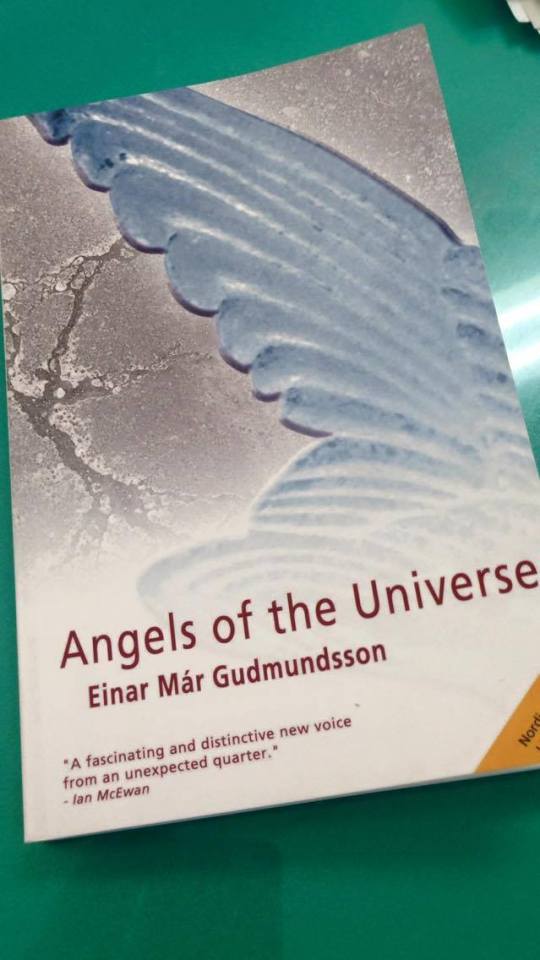
I am technically in the middle of my book for Turkey. But, it’s been a while since I’ve read it, and it was kind of an exhausting read (though incredible so far!). So, I am going to put Orhan Pamuk on hold for now, and dive into Angels of the Universe. Thank you so much Sylvia from Iceland, I can’t wait to start reading this gift. (Post to come!)
#story#personal#iceland#angels of the universe#einar mar gudmundsson#update#books#book suggestions#book recommendations#books from iceland#cultural exchange#book sharing
3 notes
·
View notes
Text
An Update!
Hello followers and friends :)
I am currently working my way through an amazing book from Turkey called The Museum of Innocence by Orhan Pamuk, but it’s taking me a lot longer than usual due to a few things. One, I have been busy lately, and finding time to read without feeling rushed has been difficult! Two, the book is long. It is by far the longest book I’ve read so far during my challenge, but I will hopefully finish it next week!
P.S. If anyone has any recommendations, please send them my way!
#update#museum of innocence#currently reading#read the world challenge#read the world project#book review#Book Recommendations#book suggestions#help me!
1 note
·
View note
Text
Argentina - “So life in its entirety, with its infinite conclusions, was, it turned out, the deduction, the genealogy, of the mysterious smile.”
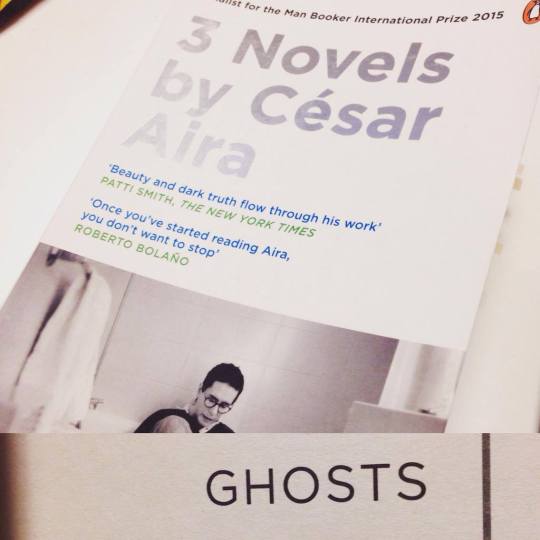
ARGENTINA - Ghosts by César Aira
This book is very, very strange. At first it seems quite mundane; it is a story about the construction of a new apartment complex and the people who work at the site. There is some interesting commentary on class differences (excellent commentary, actually) but other than that, there isn’t anything to write home about. Then comes the unexpected mention of ghosts.
Then comes the very odd description of the ghosts living in this construction zone. Characters see countless flying naked men covered in fine white dust, sometimes casually lounging about, sometimes laughing hysterically, and sometimes peeing over the railings; ghosts that align themselves in the air like the hands of a clock. Even more interesting, the characters seem to think these ghosts completely normal and unobtrusive.
Just when I thought I had the story relatively figured out, Aira then delves into an unbelievably insightful monologue (written as the dream of a character) about the meaning of art and the intersection of literature, architecture, and art. Then, the reader is given a mini anthropology lesson. (No, really.) The story takes a turn for the even weirder when one of the main characters, Patri, gets invited by the ghosts (remember, completely naked men covered in fine white dust) to a ghost’s new year’s eve party in the midst of being told by the women in her life to look for a “real man”, the only catch is, she has to be dead to go.
I also learned something I never knew before. I learned that “ghosts are gay of course!” (129).
It was a very, very strange story.
For favorite quotes, read further :)
“From a certain point on in his career, he had associated almost exclusively with two opposite fringes of society: the extraordinarily rich people who bought parts of his sophisticated buildings, and the extremely poor workers who built them.” (10)
“Reality usually outstrips predictions, even if no one has made them.” (23)
“Playing excited them so much they just couldn’t get enough. It was the equivalent of ‘living’ for adults; you’re not going to decide to die when night comes just because you’ve been living all day.” (43)
“Children always ask why.” (49)
“But there is alway sa difference between dreams and reality, which becomes clearer as the superficial contrast diminishes.” (57)
“In this sense all of the arts have a literary basis, built into their history and myths.” (57)
“The same thing happens in literature; in the composition of some works, the author becomes a whole society, by means of a kind of symbolic condensation, writing with the real or virtual collaboration of all the culture’s specialists, while other works are made by an individual, working alone like the nomadic women, in which case society is signified by the arrangement of the writer's books in relation to the books of others, their periodic appearance, and so on.” (58)
“The dreamtime, as giver of meaning or guarantor of the stability of meanings, is the equivalent of language.” (63)
“Parties were a way of suspending life, all the serious business of life, in order to do something unimportant; and wasn’t that an important thing to do?” (107)
“When you speak, you automatically stop thinking; it's like being released from a contract.” (116)
“Because, ghosts are gay of course!” (129)
“Knowledge comes through novels, of course, but not really from them.” (134)
“So life in its entirety, with its infinite conclusions, was, it turned out, the deduction, the genealogy, of the mysterious smile.” (137)
#cesar aira#argentina#ghosts#recommended books#book suggestions#borrowed books#read the world#read the world project
0 notes
Text
Ireland - “The world is a stage, but the play is badly cast.”
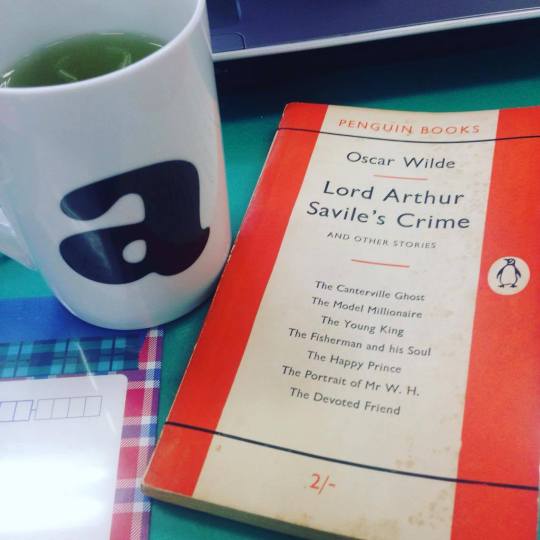
IRELAND - Lord Arthur Savile’s Crime and Other Short Stories by Oscar Wilde
I asked a friend of mine from Ireland to suggest a book for me from her home country, and she let me borrow this lovely collection of short stories. I have always wanted to read Wilde, but I never got around to it, so when she handed it to me, I was doubly happy. (Thanks Lisa <3)
Before I began reading, I was excited because I knew it would be great, but I was under the impression that it would be at the very least a slightly laborious read, as often is the case with anything written in the 19th century. However, I was pleasantly surprised at how accessible and fluid the stories were, and how hilarious of a writer Wilde is.
My favorite of the eight short stories are the first two. The first story, called “Lord Arthur Savile’s Crime” is about the ridiculousness of fate, and to what ends a sense of duty will carry someone. There is a palm reader and an exploding clock. Riveting stuff! The second (and my favorite of all) is called “The Canterville Ghost”. The story is about a poltergeist of sorts who becomes depressed after the family it tries to haunt ends up haunting him back. There is a set of twins who are very reminiscent of Fred and George Weasley (if it weren’t for the fact that they are American… and that this book was written in the late 1800s) that play all sorts of tricks on the ghost. Hilarity ensues.
This collection has only made me want to read the other books that Oscar Wilde has written. Maybe once I have finished my challenge of reading the world, I’ll loop back to Ireland again.
#ireland#oscar wilde#lord arthur savile's crime#the canterville ghost#and other stories#read the world project#borrowed books#thanks lisa#book suggestions#book recommendations
2 notes
·
View notes
Text
Mexico - “The teeth are the true windows to the soul; they are the tabula rasa on which all our vices and all our virtues are inscribed.”
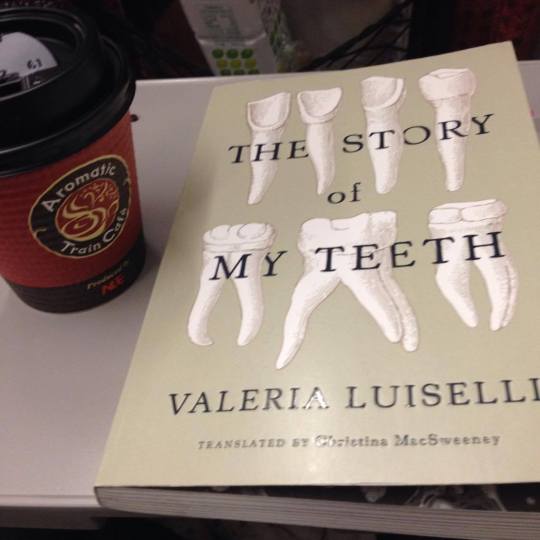
MEXICO - The Story of My Teeth by Valeria Luiselli
I started this novel on the train heading to Tokyo for a weekend of fun with my friends, and the first chapter proved to be so intriguing that while I was having dinner at a Mexican restaurant (finally!) or out at a club dancing the night away, my thoughts wandered back to this book.
First of all, yes, it is a story about teeth, but like all stories, it’s about much more than just the title. Teeth play an extremely important role in the novel and through teeth, Luiselli makes comments on not only characters, but the nature of life. The most interesting thing to point out about this book, though, is its overall structure and narration. The main character and narrator, Gustavo Sanchez Sanchez, is an auctioneer. The story is divided into different books based on auctioneering methods. The final chapter of the book is actually narrated by another character, a writer named Voragine who Gustavo commissions to write the “story of his teeth”. In the switching of the narrators, we see just how unreliable of a narrator Gustavo was as the story is retold in summary by Voragine.
Overall, the story is intriguing, captivating, some sometimes, downright strange, from multiple instances of self reference to a character who has Marilyn Monroe’s old teeth implanted into his own gums. End of review.
Luiselli provides an afterword in which explains the process of writing The Story of My Teeth and I was surprised to learn that many of the characters and locations were based on actual, real life people and places in Mexico. I also learned about the 19th - 20th century Latin American phenomenon of tobacco factory reading that originated in Cuba: someone would read books to factory workers as they did manual labor.
For my favorite quotes, read further.
“As any other story, this one begins with the Beginning; and then comes the Middle, and then the End. the rest, as a friend of mine always says, is literature.” (5)
“[Mom] had been trained to accept filth as her fate. Dad hadn’t.” (6)
“Genetics is a science full of gods.” (6)
“Once in bed, the blankets pulled up to my chest, I reach with my right hand under the pillow adn draw out the book - the way a cowboy would draw a pistol from under his pillow, but a bit more slowly.” (16)
“Other people’s misery and other people’s fortune always put my own into perspective.” (18)
“I wasn’t just a lowly seller of objects, but, first and foremost, a lover and collector of good stories, which is the only honest way of modifying the value of an object. End of declaration.” (23)
“That’s politicians for you, clergy included; their heads are so full of themselves that they aren’t the least bit curious about other people’s lives.” (38)
“‘An eye for an eye and a tooth for a tooth.’ This famous dictum is not a call to vengeance, as is commonly believed, but an invitation to value the small details of objects. God is in the details of teeth.” (44)
“The teeth are the true windows to the soul; they are the tabula rasa on which all our vices and all our virtues are inscribed.” (50)
“I study myself more than any other subject; I am my physics and my metaphysics.” (52)
“People are morbid and sordid, even when they don’t mean to be.” (54)
“I’ve always thought that hell is the people you could one day become.” (79)
“He threw himself onto me. like a man throws himself onto a woman who is resisting him.” (85)
“Because a man’s story is never complete until he dies.” (110)
“The best ideas, like the finest objects, are simple.” (123)
“You never knew when society i going to make mountains out of molehills.” (138)
#mexico#valeria luiselli#the story of my teeth#book reviews#book suggestions#read the world project#juice factory#tobacco reader#tobacco reading
1 note
·
View note
Text
Poland - “The strangeness of life, my dear sir, that’s fine in books, but it’s no good to us.”
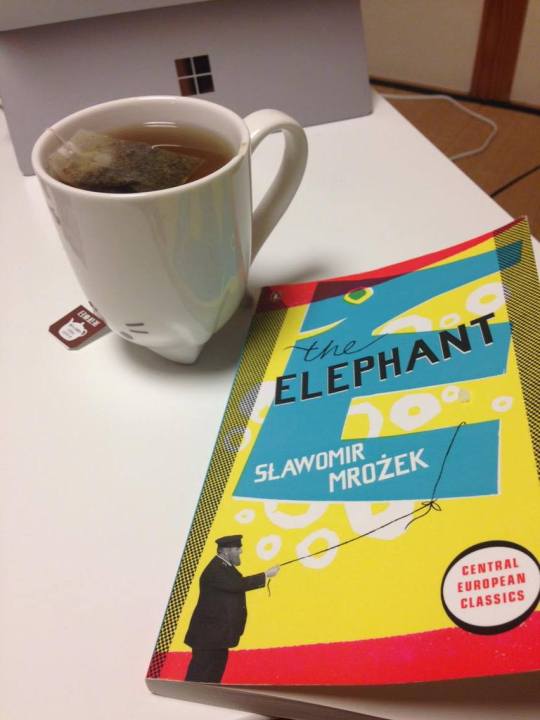
POLAND - The Elephant by Sławomir Mrożek
I haven’t been good lately about reading. Most of my reasons sound like excuses and that’s because, well, they are. I have been very busy at work lately, I have been very busy at home starting a new TV show, winter is snowboarding season, etc. etc. I just haven’t had the time!
But now that I have found the time (funnily enough, now that my TV show is finished, I just have so much extra time lying around…) I want to jump back into my reading challenge and try my best not to get distracted too easily. To that end, I picked up the next book from my borrowed stack called The Elephant by Polish writer Sławomir Mrożek. This book is chock full of short stories (fifty two, to be exact) that range from enlightening to funny, from thought provoking to just plain bizarre, but no matter where they fall on the interesting spectrum, almost every story has an undertone of political satire. I have chosen eleven of my favorites to detail below.
“Birthday” is story about a progressive as a human pet.
“The Elephant” is about a zoo that, for economic reasons, tries to use an inflatable elephant in an exhibit, an elephant that eventually floats away.
“The Trial” is a story about a hierarchical society of writers and one man who breaks the strict rules. One of my favorite quotes from this story is: “Let’s punish the hand and not the blind tool.” (34)
“The Swan” is a lovely little story about a swan who is arrested for public drunkenness, the final line of which is: “Even in the most modest position its holder must have some moral principles.” (37)
“Tiny” is about a dwarf theater actor who loses his career as he grows taller.
“The Lion” features a lion in a gladiator stadium who refuses to attack the Christians in the arena. His reasoning is extremely enlightening, and one of my favorite parts of the entire book: “Hasn’t it occurred to you why all those patricians there don’t run into the arena and themselves tear the christians to pieces, but instead rely on us, the lions?”
“In the Drawer” is about tiny people living inside the narrator’s drawer. The narrator says, “They were so small that they meant nothing to me but I could be everything to them.” (73)
“The Co-Operative” is a bizarre story about an organization that dispatches drinking buddies (very useful, if I do say so myself) packed with wisdom, such as the following: “It’s a well known fact that in company one drinks better, with greater pleasure and more.”
“An Event” is another story featuring small people, but this time it’s an elf walking along a table in front of the narrator. The elf’s appearance causes a sort of existential crisis in the narrator and prompts a rather intriguing conversation in which the narrator asks, “have you never been tempted to push through the fog that’s obscuring our true field of vision and find out what’s behind it?”
“On a Journey” is about a human telegraph line (picture a really long game of telephone across the hillsides).
And lastly, “Art”questions the purpose of art and writing, and possibly gives us insight into why the author writes his stories as he does. “Art educates. That’s why writers must know about life. That’s why the writer’s part in our society is a most responsible one.”
If a collection of stories featuring a drunk swan, a conversational elf, a wise lion and an inflatable elephant doesn’t peak your fancy, I don’t know what will.
#poland#the elephant#slowamir mrozek#short story#short story collection#book review#book reviews#book suggestions#book recommendations#read the world project#read the world challenge
2 notes
·
View notes
Text
Iran (Ramita Navai) - “They will do whatever it takes to lead the lives they want to lead.”
youtube
After reading City of Lies by Ramita Navai, I watched this interview with her, and I found it incredibly enlightening. She discusses many of the topics detailed in her book, as well as what it was like being a female journalist collecting these stories, the youth of Iran, and how many Iranian people see the future of their country.
0 notes
Text
Iran - “Most Tehranis are in constant conflict, for how do you stay true to yourself in a system in which you are forced to lie to ensure survival?”
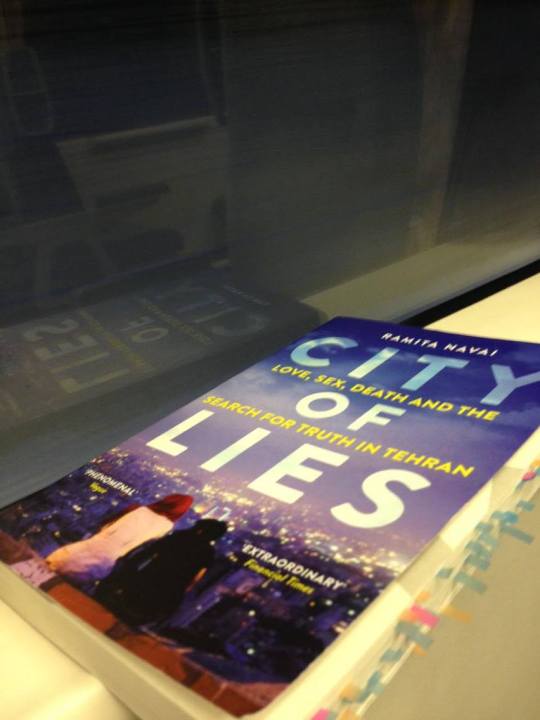
IRAN - City of Lies: Love, Sex, Death and the Search for Truth in Tehran by Ramita Navai
City of Lies was given to me as part of a huge haul of international books from a friend of mine who is also an avid reader (an understatement, I assure you). City of Lies was written by British Iranian journalist Ramita Navai and is based on real people she interviewed in Tehran, Iran. This book has been by far the most illuminating book I’ve read during my challenge (another understatement).
The book’s “tagline” is the following: “Love, sex, death and the search for truth in Tehran.” I expected to learn a lot; I expected to have my American media nourished perspective of Iran detoxified. What I did not expect was to have the rug pulled out from under me, the wool yanked away from my Western eyes, and to gape wide mouthed at almost every page. Each chapter of this brilliant book is titled after the character whose story it describes (characters that, Navai explains in her “Sources” section, are either composite characters based real people she interviewed, or are based on a singular person, however many personal details have been changed to protect anonymity).
The starting quote of the book, “Better the lie that keeps the peace than the truth that disrupts” (Sa’adi Shirazi, The Rose Garden of Saadi) was aptly chosen; Navai delves into Tehran and how lies are used by individuals living under an oppressive regime as tools to live their truths, truths that shocked this me. The recent history of Iran defines its image to the world. For many in the West, Iran IS the regime, Iran IS religious extremism, Iran IS terror. But for many Iranians, none of this is true. The following are things I learned that ARE true about Iran:
There are satellite dishes hanging off most of the houses in Tehran.
Many girls love the comfort of their chadors (a type of covering for women).
Tehrani cab drivers talk about politics a lot.
Many teenagers do have sex and find ways to ensure that their virginity appears to be intact (such as anal sex).
College students smoke weed and do ecstasy.
Iran actually has a really big drug problem and ranks among the countries with the highest levels of addiction.
As a result, things like narcotics anonymous and alcoholics anonymous are popping up throughout the country.
For many, sex is an act of rebellion, and many Iranians actually have a good sense of body autonomy.
People use something called sigheh, or temporary marriages, to have sex (sometimes with prostitutes, sometimes not) in a way that is sanctified by the state and Islamic law.
Nose jobs are popular throughout the country.
Sexual reassignment surgery is permitted by many clerics, whereas being gay is punishable.
The biggest takeaway from this book is not the facts themselves, because if the facts were about the US or Britain, people wouldn’t bat an eye. What’s important is that the true stories of Iranian people are not being told. The oppressive, dangerous, terror filled images we have of the Islamic Republic is one story, one that undermines the reality of many people who live and love there. I am reminded of Chimamanda Ngzoi Adichie’s TED speech about the danger of a single story (which if you haven’t watched, you should here). People DO party, people DO have sex, people DO find ways to be with the ones they love and do what they wish under the watchful eye of oppressive leaders who aren’t representative of the people over whom they rule.
This book is about their stories and should be considered a weapon against the ideologically charged Western view of the Islamic Republic of Iran.
Below are my favorite quotes separated by chapter.
“Let’s get one thing straight: in order to live in Tehran you have to lie. Morals don’t come into it: lying in Tehran is about survival.” (xiii)
“When the truth is shared in Tehran, it is an act of extreme trust or absolute desperation.” (xiii)
“Most Tehranis are in constant conflict, for how do you stay true to yourself in a system in which you are forced to lie to ensure survival?” (xiv)
“These are all true stories from the city of lies.” (xv)
SOMAYEH -
“People are less interested in your business on the streets of north Tehran; too involved in their own conversations and recoiling at anything that may prick the bubble in which they live.” (8)
“Satellite dishes are all over Iran, from Tehran to rooftops of remote villages, hanging off the homes of those from all classes, secular and religious alike.” (31)
“The fact that she had been caught leaving a boy’s house while his parents were out was enough to brand her a whore. [...] he had broken the rules; but more than that, she had done something they all longed to do.” (32)
“The simple black cloth stood for modesty and piety; for supplication to God and a spiritual, ordered world where rules were in place to protect. It was all these things and more. It was her oversized comfy cardigan, hiding her when she had her period and she was feeling bloated.” (36)
“Iran’s mullahs are not only authorities on islamic theology, but are also experts at finding moral decay in the most unlikely places.” (41)
“We embrace sorrow like no one else, wailing on demand, tapping into the vats of love and los that simmer in the cauldrons of our hearts.” (45)
“Talk of politics allows people to feel like they have a stake in their future, that they are not powerless spectators.” (46)
“Every now and again, Amir-Ali and his friends would get lucky, but it was nearly always anal sex so the girl’s hymen would remain untouched and she would still be a virgin for her wedding night.” (55)
AMIR -
“The morality police scavenged like circling cultures around the square, seeking their prey: young, skinny jeaned girls in ballet pumps wearing nail varnish and buying bright, tight cloth.” (84)
“Mosques repelled him; no matter how impressive the architecture, he could not stand them. for Amir they symbolized the hijacking and ruin of the revolution. It was here the gullible were fooled and power-crazed mullahs delivering tittle-tattle sermons manipulated the God-fearing. It was here, on garish Persian carpets, in rooms that stank of swearing feet and cheap rose water, where beautiful verses from the Koran were corrupted.” (85)
“Amir’s own atheism was one of his most treasured secrets. But there were no rules in this game, when laws could be twisted and manipulated to whatever effect was needed.” (87)
“And then the drinking, bootleg whisky and home-brewed vodka to warm up spirits so dampened by oppression. The need to dance and drink is as great as the need to dissent.” (93)
BIJAN -
“After the war with Iraq, thousands of Iranians travelled to Japan.” (136)
“The head of the anti-narcotics unit had just declared that Iran was the fifth highest consumer of crystal meth in the world.” (138)
“In Iran, the ‘no’ gesture is a backward tilt of the head. With the No Rule, you had to imagine the tip of a sword was touching your chin as you were being questioned. If you said yes, your head would fall on the sword.” (144)
LEYLA -
“They fell in love the way teenagers do, with a dramatic intensity that masked any lack of substance.” (154)
“It is impossible to escape sex in Tehran.” (160)
“The regime valiantly goes into battle against sex.” (160)
“The girls [prostitutes] were armed with their own means of protection. When bribery [with cops] did not work, they would produce folded sigheh papers from their handbags. Sigheh is a temporary marriage approved by both God and the state, between a man (who can already be married) and a woman (who cannot), and can be as short as a few minutes or as long as ninety-nine years. It is Shia pragmatism at its vital best, ensuring that even a quickie can be given an islamic seal of approval and be sanctified in the eyes of the lord.” (164)
“She figured that within a few years she could open her own beauty salon, a good earner in a city where, no matter how severe the economic downturn, women always found the money to beautify themselves.” (178)
“Sex is an act of rebellion in Tehran. A form of protest. Only in sex do many of the younger generation feel truly free. They have ultimate control over their bodies, if nothing else in their lives, and they have made them weapons of revolt. It is a backlash against years of sexual repression.” (179)
“Sophistication could be bought for the price of a Western education and a passing knowledge of art.” (183)
MORTEZA -
“Illegality stamped the gatherings with added importance, binding the men closer together, brothers in arms.” (190)
“‘Death to Israel!’ The children, who were all around the same age as Morteza,parroted back the rallying call, but only a few of them knew what Zionism was, or why Iran considered the West the enemy.” (198)
“Within a few months, Morteza was madly in love. He thought he would accept a grisly death in exchange for Ebbie taking him in his arms. It was not the first time Morteza had been in love with a boy.” (204)
“Several cases have been reported of gay men who have been forced into having sex change operations by their families, as being transgender is more acceptable than being gay.” (297)
ASGHAR -
“Reputation was everything, and your name was your reputation.” (237)
FARIDEH -
“Farideh dreaded her brushes with the city. Despite all the years, it was impossible not to feel stabs of longing when she drove through the streets for the Tehran she had loved, full of miniskirts, discos, and pool halls; juice bars and vodka bars, donkey carts and new cars; the triumph of colours and music on the streets; the thrill and buzz of a new epoch; milkshakes and cigarettes and wine and song.” (253).
“During the darkest days, they had partied the hardest despite the dangers, drinking and dancing and loving like they never had before.” (256)
#iran#islamic republic of iran#ramita navai#city of lies#sex#love#death#tehran#truth#book reviews#book suggestions#read the world#read the world project#favorite books
1 note
·
View note
Text
Dominican Republic - “Years later you would wonder if it hadn’t been for your brother would you have done it?”
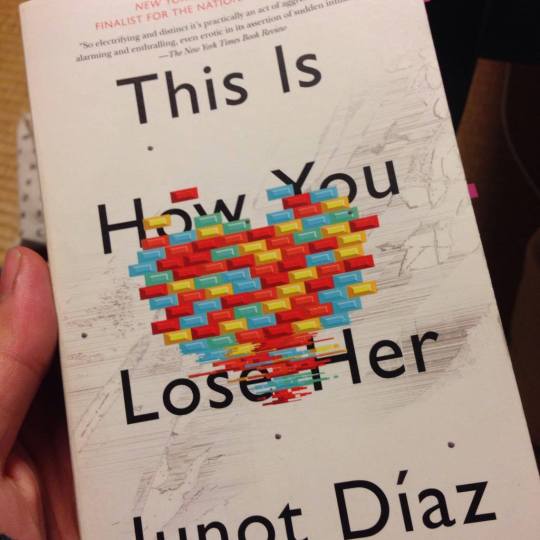
DOMINICAN REPUBLIC - This Is How You Lose Her by Junot Díaz
I chose to read This Is How You Lose Her by Junot Díaz for the Dominican Republic. Junot Díaz himself is Dominican American, and the book largely takes place in America featuring characters and a narrator that are Dominican American. In some ways, this violates the rules of my project, but I am happy I bent them in this case. Another rule I bent? I have technically read two of the short stories in this book before, but I put it down after I finished them. The reason I set This Is How You Lose Her back on my shelf is because I had a hard time stomaching the hypermasculine, womanizing narrative of the first two stories. I am really happy I picked it back up, though, because if I had never reread them and finished the book, I would have missed the point.
Let me start by taking you through the narration and some of the short stories in the book. While it is a collection of short stories, they all center around a character named Yunior and more often than not, he is the narrator. Díaz excellently uses narrative voice to create a character that is believable (so believable I put the book down) and his use of language is masterful. He employs American slang, Spanish slang and a peppering of Spanish words and phrases (only two of which I had to look up!), as well as a stream of consciousness, free form style that makes for a very rhythmic read. His words roll around in your head a while, and once swallowed, are easily digestible. He is vulgar, visceral, and voracious in his detailing of Yunior’s every thought, no matter how rooted in patriarchy they may be. Díaz also occasionally uses second person narration, which pulls the reader into the story even more personally. Once I got going, I actually just read the book from start to finish without much pause.
Now for the stories...
“The Sun, the Moon and the Stars”
This story is about how actions can tear apart relationships, but it’s a slow rip. A souring, really, until ultimately, you cannot stand the taste anymore. This story is one of the only ones that takes place in the Dominican Republic, and Diaz takes the chance to comment on the tourism industry in the DR by detailing a resort that was “like a separate country” where people could visit and “see the island” while ignoring the poverty outside the resort’s borders.
“Nilda”
In this story, we see the decline of Yunior’s brother’s health, his brother’s hypermasculinity, and racial issues ranging from the gentrification of latino neighborhoods to the power that white men use in relationships with women of color.
“Alma”
“Alma” is the shortest and most sexual story of them all, but it’s also my favorite. There was something very feminist about the sex, and the story ends with the titular line: “This is how you lose her.” This story gave me a new understanding of the book as a whole and the energy to see it through to the end.
“Otravida, Otravez”
Otravida, Otravez is the only story from the perspective of a woman, and the only story that isn’t about a relationship’s end or decline. I have a feeling that this was intentional, that there is something we are supposed to glean from that narrative choice: if you incorporate the woman’s perspective, see the relationship from her point of view instead of always focusing on the masculine, the relationship won’t be doomed to failure.
“The Pura Principle”
It is in this story that we start to see Yunior unpack a lot of cultural learning. We see him reflect on his brother’s actions and his mother’s constant forgiveness. It’s also the first time Yunior acknowledges his male privilege (and actually uses those words).
“Invierno”
In this story, Yunior recounts his arrival in the states as a boy, and hints at his father’s infidelity.
“Miss Lora”
In “Miss Lora”, Yunior starts to give a name to his hypermasculinity and acknowledge his faults. There is a conscious unpacking of his learned behavior. He is very blunt in his analysis, saying “but you are your father’s son and your brother’s brother”. This story is also one of my favorites, and the narrative style differs from the rest of the stories.
“The Cheater’s Guide to Love”
In this final tale, all the consequences of his actions are finally destroying Yunior. He deals with the guilt and pain and loneliness his mistreatment of the women in his life has caused him, and as a result he destroys his own body by working out so much it damages his health. The consequences literally seep into his skin and he has to live with the wreck he’s become. In this chapter, he finally has a close friend that is a woman who he treats with respect. It is through this character that we understand he begins to see women as people, and recognize his own faults.
The entire novel, This Is How You Lose Her, is a call out, an admonishment, a chastisement of hypermasculinity, cheating, and patriarchal attitudes towards women. The women in Díaz’s stories are seen through Yunior’s eyes and actions, through a womanizing masculinity, and yet there are subtle hints of their own power, their own moral fortitude and strength, that shine through and in the end become clearer and clearer. And if I had never picked it up again, I never would have understood the sheer brilliance of Junot Díaz’s work.
#dominican republic#junot díaz#junot diaz#this is how you lose her#masculinity#love#book review#book suggestions#book recommendations#read the world project#read the world challenge
6 notes
·
View notes
Photo
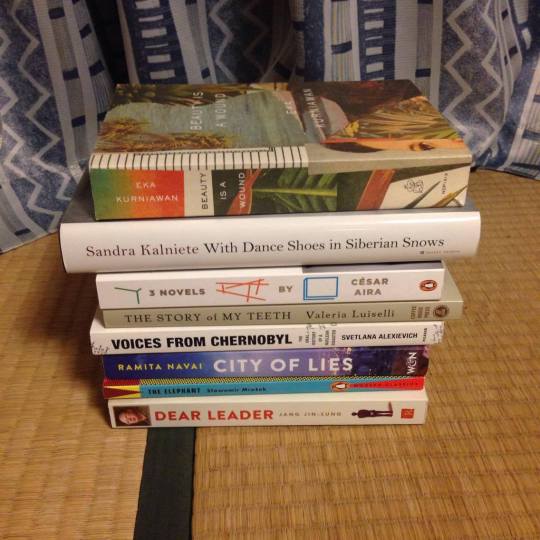
A lovely stack of books that my friend is letting me borrow. Eight countries!! :) Can’t wait to read them!!
1 note
·
View note
Text
Afghanistan - “For you a thousand times over.”

AFGHANISTAN - The Kite Runner by Khaled Hosseini
This book was.... powerful.
I am really happy I read this book so soon after I read I am Malala. When I read Malala Yousafzai’s novel for Pakistan, there were many references to historical events in Afghanistan and Pakistan that I didn’t fully understand, but in many ways, The Kite Runner filled those gaps. This book details the horrors that Afghanistan faced during a time that would come to define its image for the rest of the world.
While this novel is about Afghanistan, Afghan culture, and the historical events of the late 1970’s onward, it is also the story about Amir, Khaled Hosseini’s narrator. Amir tells his story with brutal honesty; he looks back on his life and his actions with almost cruel clarity as he recounts the life he led as a privileged young boy in a pre-Russian invasion, pre-Taliban Afghanistan. He paints a vivid picture of a childhood he shared with his best friend and family servant, Hassan, both the beautiful parts of their unbalanced friendship and the cruelty that privilege allows the privileged.
Ultimately, if one were to ask me what The Kite Runner is about, I would reply by saying that this novel is about guilt and redemption. The bulk of the brilliant and heartbreaking narrative surrounds Amir trying to atone for the“sins” of his youth, to grapple with the guilt he feels regarding the actions of his childhood and his failings in his relationship with Hassan. But, as any reader knows (or as Chimamanda Ngozi Adichie brilliantly states in her novel, Americanah), a novel doesn’t have to be about just one thing, and this book is a perfect example of that.
Khaled Hosseini is an amazingly talented writer, and an extremely smart writer. From his figurative language to his deceptively simple, yet beautiful prose, it is a very difficult book to put down, and the images he paints are very difficult to get out of your head (especially the more haunting ones). I highly recommend this book to, well, everyone.
Below are my favorite quotes.
“I see you’ve confused what you’re learning in school with an actual education.” (18)
“Children aren’t coloring books. You don’t get to fill them in with your favorites.” (24)
“History isn’t easy to overcome. Neither is religion.” (27)
“Words were secret doorways and I held all the keys.” (32)
“The generation of Afghan children whose ears would know nothing but the sound of bombs and gunfire was not yet born. (39)”
“The Hindi kid would soon learn what the British learned earlier in the century, and what the Russians would eventually learn by the late 1980s; that Afghans are an independent people. Afghans cherish custom but abhor rules.” (56)
“To this day, I find it hard to stare directly at people like Hassan, people who mean every word they say.” (59)
“That was the thing about kite flying; your mind drifted with the kite.” (69)
“War doesn’t negate decency. It demands it, even more than in times of peace.” (126)
“Tea, politics and scandal, the ingredients to an Afghan Sunday at the flea market.” (150)
“It turns out that, like Satan, cancer had many names.” (169)
“I knew all about regret.” (195)
“There is a way to be good again.” (207)
“It always hurts more to have and to lose than to not have in the first place.” (228)
“But time can be a greedy thing - sometimes it steals all the details for itself.” (231)
“When you tell a lie, you steal someone’s right to the truth.” (243)
“Exploitation to finance a beach house in Hawaii was one thing. Doing it to feed your family was another.” (287)
“A man who has no conscience, no goodness, does not suffer.” (324)
“There are a lot of children in Afghanistan, but little childhood.” (342)
“Perspective was a luxury when your head was constantly buzzing with a swarm of demons.” (384)
“He walked like he was afraid to leave behind footprints.” (390)
#the kite runner#khaled hosseini#afghanistan#pakistan#i am malala#book reviews#book recommendations#read the world project#reading challenge
9 notes
·
View notes
Text
The United States - “They seemed to be staring at the dark, but their eyes were watching God.”
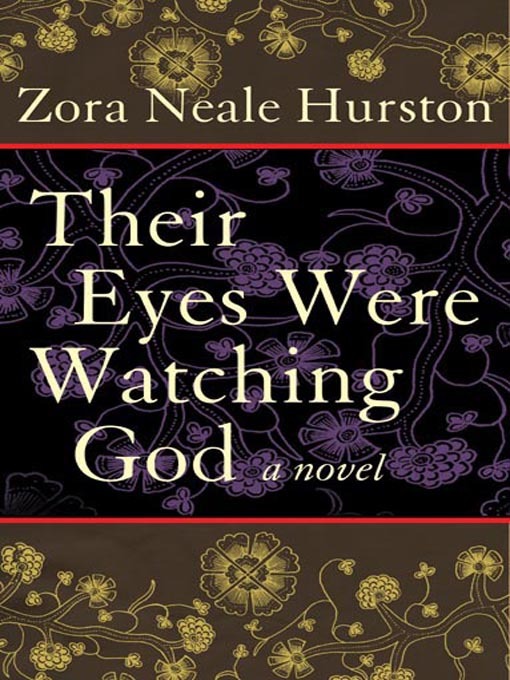
THE UNITED STATES - Their Eyes Were Watching God by Zora Neale Hurston
I chose to read Their Eyes Were Watching God as my book from the United States in my project to read the world for a few reasons. Being American, I have read many “classic American novels” in school and many non-classic-but-just-as-good teen fantasy/fiction (though thankfully the Twilight series is NOT on my list of completed books). But, most of the " American classics” I read when I was younger were written by white American men. I deliberately chose to read a book by an African American woman as my United States book to fill in some of the gaps in my literary repertoire from my own country. This book was also recommended to me by my sister as a great book, and I have read snippets of some of Zora Neale Hurston’s essays and prose, but never her seminal novel.
I am really happy I did. I learned so much reading this incredible novel. The prose reads like poetry, the dialogue is excellently crafted, and the narrative is extremely satisfying. It is the story of a young girl becoming a woman in a post slavery (but not really post slavery) America who finds her own sense of self.
It’s a story about age. It’s a story about love. It’s a story about race. It’s a story about gender, and about women.
But mostly, it’s the story of Janie. Please read it.
#their eyes were watching god#the united states#zora neale hurston#read the world project#book reviews#book recommendations
7 notes
·
View notes
Text
Portugal - “No one can live someone else’s life.”
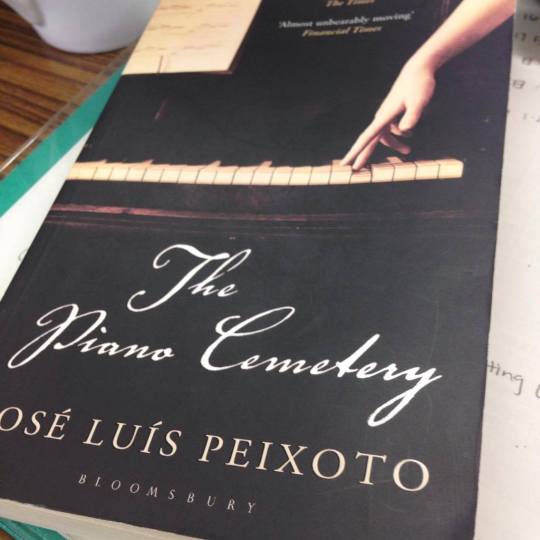
PORTUGAL - The Piano Cemetery by Jose Luis Peixoto
The Piano Cemetery was an interesting read. I chose this book by chance, without knowing anything about it beforehand, from the shelf of a bookstore in Taiwan. I am happy I read it, however, if I am honest, it is the first book I’ve read during this project that I wanted to put down several times while reading it.
The most interesting (and, unfortunately, most confusing) facet of this novel is the narrative voice. There are two narrators, a father and a son, both with the same name (Francisco). Near the end of the novel, the line between narrators blurs in an interesting twist. Another quirky aspect of the narration is it’s non-chronological style. I usually love non-chronological story lines, but the author sometimes jumps between different time lines mid sentence. While this is definitely a unique stylistic choice, it didn’t sit well with me, and more often than not, I was confused as to where I was in the story.
That being said, there were some things I loved about the novel. Again in terms of narration, the father is an unreliable narrator, particularly when he talks about his own acts of abuse and violence. However, there are these crystal clear moments when the author cleverly calls the narrator out and showcases his own unreliability (and condemns domestic violence, which, yay). The author uses the narrator’s granddaughter to break the “fourth wall”, if you will, and directly brings the reader into the story and condemn the grandfather’s actions.
Time is also a very important element in this novel, and I loved the way Piexoto played with it. Many of the quotes below deal with insights the author has about time. The way it slows when we don’t want it to and the way it seems to disappear when we need it are just some of these observations.
“I looked at my watch - time was very fast.” (25)
“I looked at my watch. The morning. The morning the size of a summer. The whole morning. I looked at my watch. Time was very slow.” (26)
“If I had been close enough, I believe I could have seen birds gliding within her eyes, it would be a month of spring within her eyes - endless.” (32)
“My wife was younger on Sunday mornings when she smiled.” (35)
“On Sundays, the birds are freer.” (48)
“It was as if I was trying to grasp the whole of the afternoon and pull it into my chest.” (59)
“Inside our closed eyes we hugged.” (72)
“Time has no will, it has instinct. Time is less than a running animal. It doesn’t think where it’s going. When it stops, it is anxiety or desire that obliges it to stop.” (74)
“To run is to be absolutely alone.” (112)
“Her hands were just like butterflies dying on the keys.” (120)
“No one can live someone else’s life.” (179)
“Lisbon is the pattern of cracks, like lightning flashes, slipping down the surface of the walls. Lisbon is careful imperfection. Lisbon is the sky reflected” (197)
#jose luis peixoto#the piano cemetery#portugal#book review#book suggestions#Book Recommendations#read the world#reading the world project
1 note
·
View note
Text
Brazil - “When you want something, all the universe conspires in helping you achieve it.”
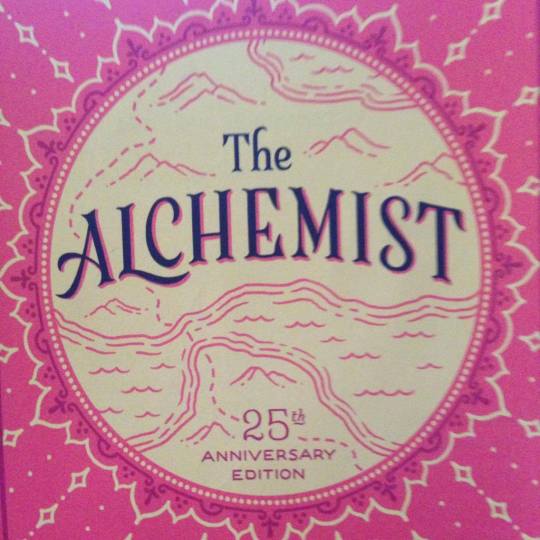
BRAZIL - The Alchemist by Paulo Coehlo
The Alchemist was recommended to me by a great friend of mine who reads more than most people I know. I had no idea what to expect (mainly because this particular friend hates spoilers more than I hate wasps).
For those of you who haven’t read it, it is a novel about adventure, finding your own path, and following it with all your soul. It is also (kind of) a book about an alchemist, but that’s not the important part. A core idea in the novel is that of one’s “Personal Legend” and the importance of seeing it through to the end. I found The Alchemist to be an extremely intriguing book and reading it to be a very interesting process. There were times when I felt like I was reading a holy text rather than a proper novel. Paulo Coehlo’s writing style is simple yet complex, declarative rather than speculative. While the story is about an adventure and has a fast pace, the entire novel is peppered with amazing, thought provoking lines that force you to slow down. These are some of my favorites:
“Everyone seems to have a clear idea of how other people should lead their lives, but none about his or her own.” (18)
“It’s not what enters men’s mouths that’s evil [...] It’s what comes out of their mouths that is.” (118)
“One is loved because one is loved. No reason is needed for loving.” (126)
(I am a sucker for great one liners…)
While I found the novel to be interesting and very well written (beware: there are spoilers-ish up ahead, sorry friend), I felt conflicted about the actual message. The quote I chose for the title of this post occurs throughout the novel, and it seems to be one of the novel’s central messages. “When you want something, all the universe conspires in helping you achieve it.” The problem I have with it is…
I don’t actually believe it to be true. I am all for happy endings, but I don’t believe the universe or God is out there trying to help you accomplish your goals. Call me a cynic, but I don’t believe in omens or signs, and I don’t believe the world itself has a soul that connects all things. Fate is an idea I have a lot of trouble accepting. I believe in choice; I believe that the choices we make and choices that are made for us decide our paths. I don’t mean to downplay the story, it’s a great story. I think the reason I want to make this point is that reading this book helped me realize how strongly I believe in what I do.
I loved this little book. It’s a beautiful story, and as I said, there are some wonderful quotes throughout the text that really make you stop and think. Below are some of my favorites:
“And he knew that shepherds, like seamen and like traveling salesmen, always found a town where there was someone who could make them forget the joys of carefree wandering.” (9)
“But ever since we had been a child, he had wanted to know the world, and this was much more important to him than knowing God and learning about man’s sins.” (10)
“The world was huge and inexhaustible.” (13)
“It’s the possibility of having a dream come true that makes life interesting.” (13)
“It’s the simple things in life that are the most extraordinary; only wise men are able to understand them.” (17)
“Everyone seems to have a clear idea of how other people should lead their lives, but none about his or her own.” (18)
“When you want something, all the universe conspires in helping you achieve it.” (24)
“When each day is the same as the next, it’s because people fail to recognize the good things that happen in their lives every day that the sun rises.” (30)
“I’m like everyone else - I see the world in terms of what I would like to see happen, not what actually does.” (43)
“This wasn’t a strange place; it was a new one.” (44)
“You’re different from me, because you want to realize your dreams. I just want to dream about Mecca.” (57)
“Every blessing ignored becomes a curse.” (58)
“Sometimes, there’s just no way to hold back the river.” (60)
“Making a decision is only the beginning of things.” (70)
“When you can’t go back, you have to worry only about the best way of moving forward.” (80)
“When you are in love, things make even more sense.” (103)
“When you improve the present, what comes later will also be better.” (106)
“It’s not what enters men’s mouths that’s evil [...] It’s what comes out of their mouths that is.” (118)
“One is loved because one is loved. No reason is needed for loving.” (126)
“Tell your heart that fear of suffering is worse than suffering itself.” (134)
“Usually the threat of death makes people a lot more aware of their lives.” (147)
“I have inside me the winds, the deserts, the oceans, the stars, and everything created in the universe.” (151)
“When we strive to become better than we are, everything around us becomes better too.” (155)
#brazil#the alchemist#paulo coelho#read the world#reading the world project#book review#book reviews#book suggestions#book recommendations#fate#personal legend
31 notes
·
View notes
Text
Germany - “And if I was not guilty because one cannot be guilty of betraying a criminal, then I was guilty of having loved a criminal.”

This book was recommended to me by a friend. I had been trying to find a copy online for relatively cheap or a friend who has a copy I could borrow (because if I keep buying these books in stores, this project will be way too expensive for me to complete), but I hadn’t been too successful.
I set off for my trip to Taiwan, and I didn’t expect to have much time to read, and during my first week there, I definitely wasn’t thinking about books. But when I arrived at my third hostel in the beautiful, nature filled area of Hualien, I found an entire bookshelf of English books that were available for borrowing. Lo and behold, The Reader was on the shelf. (I immediately messaged my friend about my luck, and then read the entire thing).
The Reader is a relatively short book about a young boy turned man in a post-war Germany. I don’t want to give too many details away…. But, the boy, Michael Berg (the narrator, as well) has a relationship with a much older woman at fifteen years of age. Then later, as a law student, he discovers her again in a courtroom on trial for war crimes. This story is about his struggle, about Germany’s post-war struggle, and about who is to blame for the horrors committed during the Holocaust. It’s also about books.
I liked this story a lot. There were parts that I had to reread, there were parts I had to think about for a long time, and there were lines I had to mull over in my head before I think I actually understood the author’s intention. I think I understand him, now. And if I am right about how I’ve interpreted the story, there is a poignant and powerful point he is trying to make about history that is, to say the very least, important.
For favorite quotes (without page numbers this time...) read further.
“Why? Why does what was beautiful suddenly shatter in hindsight because it concealed dark truths?”
“Because happiness is only real if it lasts forever?”
“But waking from a bad dream doesn’t necessarily console you.”
“We made love in the mornings.”
“When an airplane’s engines fail, it is not the end of the flight, Airplanes don’t fall out the sky like stones. They glide on, the enormous multi-engined passenger jets, for thirty, forty-five minutes, only to smash themselves up when they attempt a landing. The passengers don’t notice a thing…. That summer was the glide path of our love.”
“What do you want? Your whole life in in night?”
“But it was if she wanted us to drown together.”
“We all condemned our parents to shame.”
“And if I was not guilty because one cannot be guilty of betraying a criminal, then I was guilty of having loved a criminal.”
“Philosophy has forgotten about children.”
“There was no need to talk, because the truth of what one says lies in what one does.”
2 notes
·
View notes